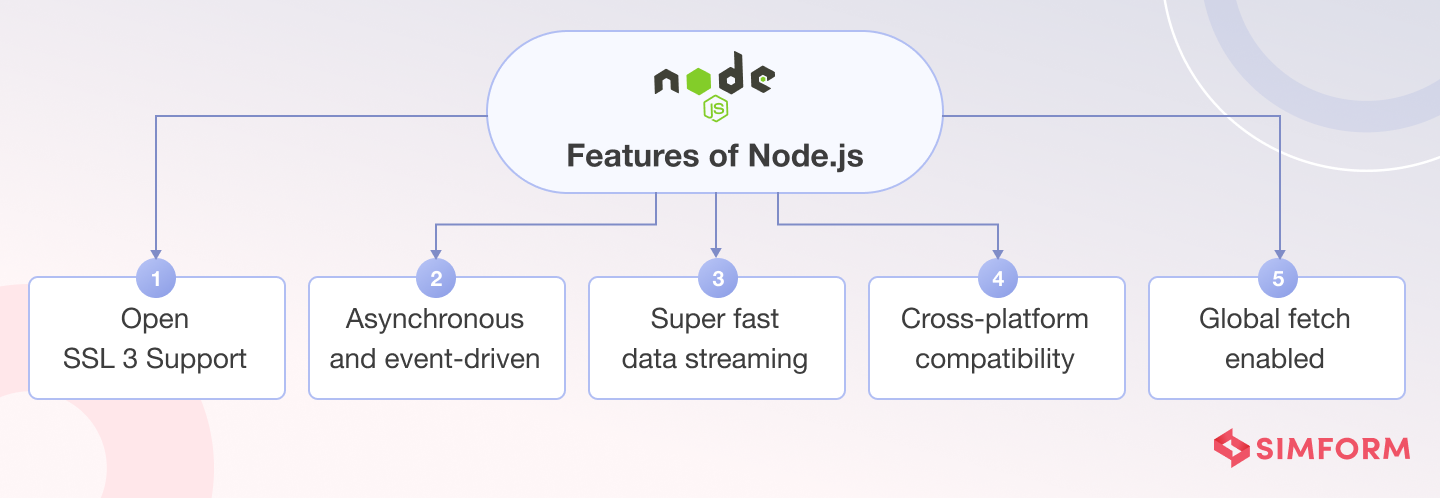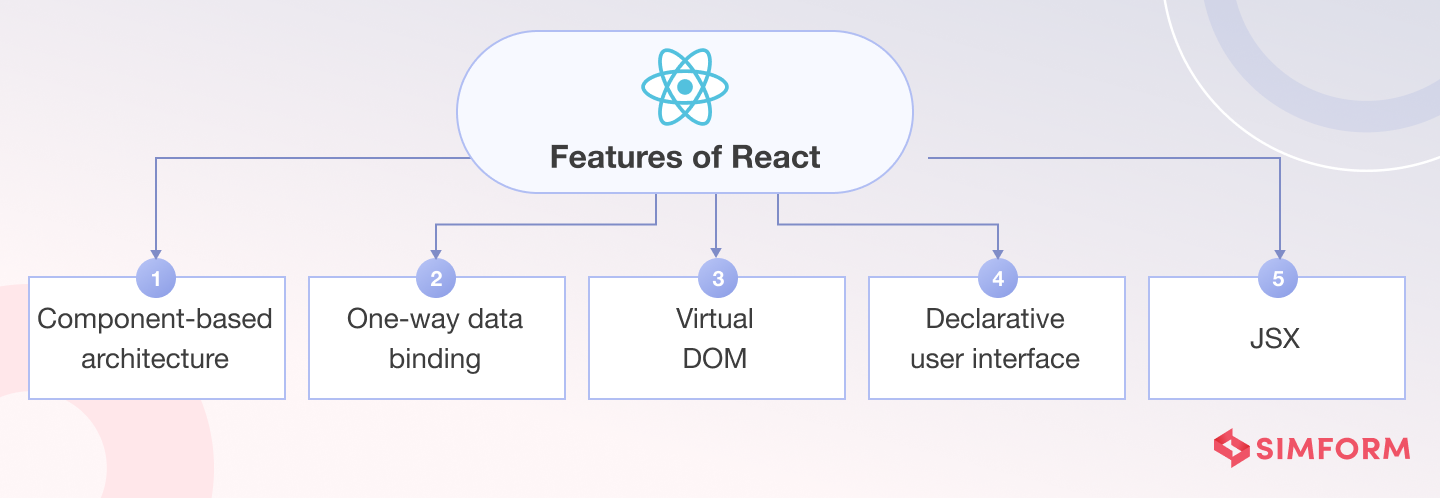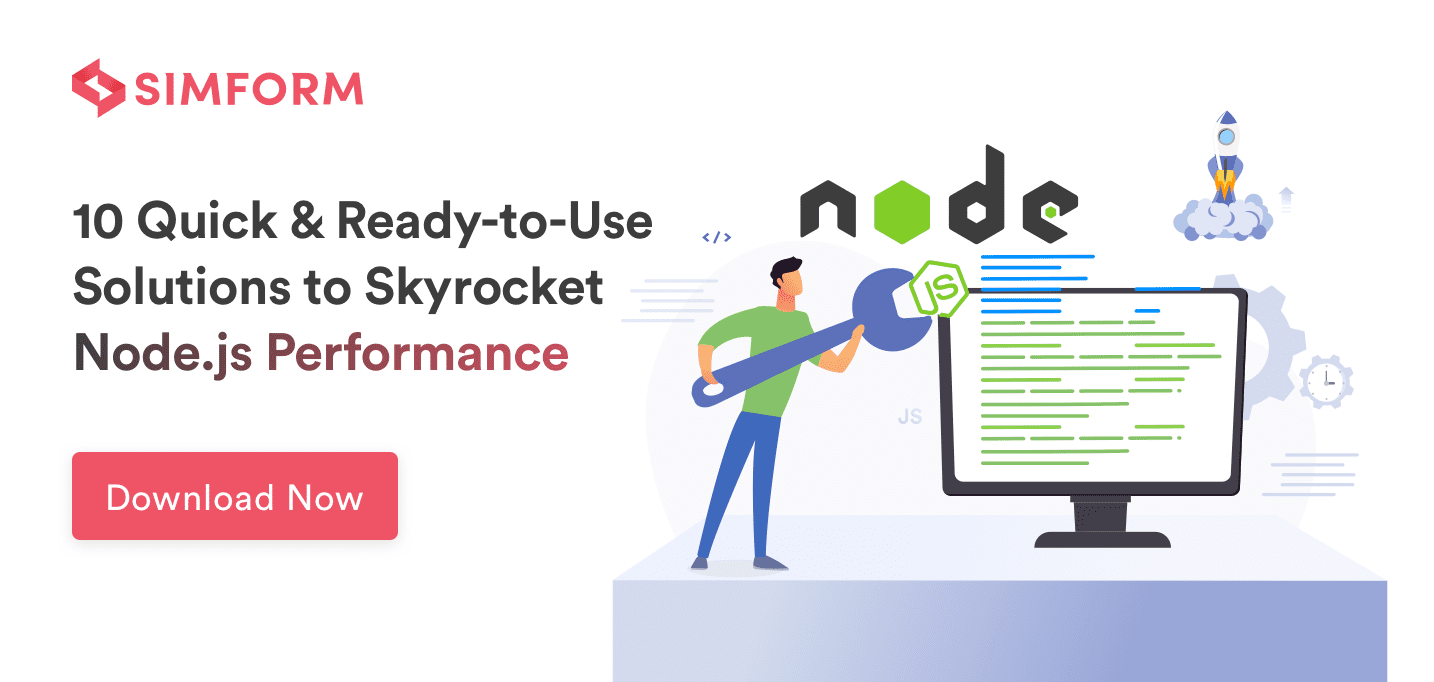During my early correspondence with new clients, these questions typically come up without fail:
- Which Javascript library would be a better fit for my project– React or Node?
- I have heard Nodejs is scalable. Could we use it with React?
- I also need a scalable UI for my web application. What do you think is the better option, Reactjs or Nodejs?
As I began responding to these questions on a daily basis, I knew I had to give a detailed account of Nodejs and React, covering all the whys, hows, and what ifs. Here’s when I thought of writing a dedicated article that covers these questions.
In this blog, I will explain to you 5 reasons why you should use Nodejs with React. But before we dig into the meat of the matter, let’s kick things up with a few notches and get the basics right.
What is Node.js?
Built on Google Chrome’s V8 Javascript engine, Node.js is an open-source, cross-platform library and runtime environment. It’s majorly used to run applications outside the client browser.
Node.js empowers developers to build robust, server-side applications that are fast and scalable. Particularly for real-time applications, Node.js has become a common choice due to its event-driven, non-blocking I/O architecture.
What makes Node.js different from other runtime environments is its capability for single-thread processing. Single-thread architecture makes a framework easily scalable and highly performant. That is why around 2% of all websites across the globe are built using Node.js.
Features of Node.js

- Non-blocking, asynchronous, and event-driven
- Open SSL 3 Support
- Super fast data streaming
- Cross-platform compatibility
- Core test runner module
- Global fetch enabled
Advantages of Node.js
- Enables easy vertical and horizontal application scaling
- Improves application performance with its non-blocking thread execution
- Has a vast ecosystem of packages that make web development easier
- Facilitates easy app maintenance as it enables the development of both the frontend and the backend using the same language (JavaScript)
- Massive community support
What is it used for?
Node.js is commonly used to build:
- Streaming web apps
- Real-time collaboration tools
- Advanced Single Page Applications (SPAs)
- REST API servers
- Microservices architecture
What is React?
React is a front-end development open-source JavaScript library used to create user interface (UI) components. Its component-based and declarative characteristics allow developers to create interactive and complex user interfaces.
React also employs a virtual DOM (Document Object Model) to manage updates efficiently. This makes state management in React applications seamless. Although React is a library, you can integrate a few third-party libraries with it and it is ready to work as a full fledged front-end framework.
React was launched by Facebook and since then, it has been maintained and updated by a large community of developers.
Features of React

- Component-based architecture
- One-way data binding
- Virtual DOM
- Declarative UI
- JSX
Advantages of React
- Reusable components
- Effortless dependency handling
- Efficient state management
- Excellent developer tools
- Seamless template designing
- SEO-friendly
What is it used for?
React is commonly used to build:
- Dashboards and data visualization tools
- Social networking web apps
- eCommerce websites
- Discussion forums
- Single page applications
- REST APIs
Can you use Node.js with React?
Yes, definitely, and in fact, Node.js is the most convenient platform for hosting as well as running a web server for a React application. It’s because of two main reasons –
- Firstly, it seamlessly integrates with the NPM registry, making package installation easy through the NPM CLI.
- Secondly, Node.js can bundle a React application into a single file, simplifying compilation using tools like webpack and other Node modules.
But in some cases, a complete backend overhaul may not be practical, especially if you are already using Ruby on Rails (RoR) as your backend solution.
However, there is a workaround: you can use Node.js to run the web server for hosting your React application. Node.js pairs well with Ruby on Rails, as RoR handles the backend while Node.js efficiently manages the web server for React.
By integrating Node’s tools with RoR’s asset pipeline, development with CommonJS becomes more streamlined.
Remember, React renders UI components on the frontend, while Node.js manages server-side data communication. The synergy between React and Node.js creates a cohesive and responsive web application.
Top 9 Reasons to Use Nodejs with React:
1. High server load: Using Nodejs with React makes sense when your web application needs handling of multiple requests and maintaining server load balance.
2. Real-time data: If your application’s core is based on Real-time Data-Intensive management or Data Streaming, using Nodejs is highly advisable for continued server connection.
3. JSON APIs: Building JSON APIs for your application is very efficient with Nodejs due to high code reusability and easy code sharing in Reactjs.
4. Single Page Applications (SPA): Developing Single Page Applications in React while using Node to build a lightweight backend model for asynchronous data loading through callback functions.
5. MERN stack: Nodejs can also be used with React with MERN (MongoDB, Express, React, and Nodejs) stack.
6. Scalability: Node and React enables developers to build multi-device, responsive, data-driven web apps with scalability for large projects, ensuring optimal website performance across various devices.
7. Fast Development: Using React and Node for web app development yields high ROI, saving time and money. These technologies excel in creating fast and easy-to-maintain websites.
8. Single Language for Front-end and Back-end: Using Node and React together, developers avoid the need to learn complex back-end languages like Python or Ruby. They can use Node for server-side development and React for front-end coding seamlessly, saving resources, money, and time.
9. Organized Process: The combo of React and Node streamlines web development. These scalable, effective, and fast technologies work together to create high-functioning websites.
How to do React Migration And Increase Your Performance 3X?
Can Node.js with React Help Meet Changing Market Demands?
React and Node.js top the chart when it comes to the widely used frameworks by the developer community. In the StackOverflow survey 2022, around 47.12% of respondents said they have used Node.js extensively in their projects, while 42.62% of respondents have loved working with React.
Product owners looking to develop responsive and modern web applications that manage large amounts of data would find the combination of Node.js and React an excellent choice.
React’s flexible design model provides users the convenience and flexibility to create reusable UI elements. In contrast, Node.js’ event-driven model enables more efficient and effective handling of massive data.
Considering the market trends and the growing popularity of both frameworks, we can infer that they will grow in the coming years.
Wrapping Up
Undeniably, both React and Node have different functions such as React for front-end, and Node for the backend. Nodejs can do a lot more than making servers; it can do all sorts of scripting and CLI tools.
If you want to use Node.js with React, knowledge of NPM is essential. React is best utilized in a Node environment unless a backend is needed. Combining React with Node can greatly enhance project scalability, as demonstrated by its success at tech giants like Netflix and PayPal.
Planning to combine React as a front-end with Node as a backend for full-stack web application development? Hire experienced and dedicated developers and start your two weeks free consultation call.


Mahmoud Adel
Good article
Nik
Good information
Pankaj Bhosale
Detailed and nice article explained in very simple language to make understand everyone
Gaurav Bisht
Nice article with simple explanation
Gagan
Wonderful explanation. I had this doubt before jump into React.
Kantilal Jadav
This article is clear and easy to pick up. Very helpful, thank you for sharing.
IC
Thanks
SUBHRANIL GHOSH
Wow
Josue Isamuna
Thank your for this article. It gave me a great motivation to combine both Nodejs and React.
Harry Naruto
More detail explanation